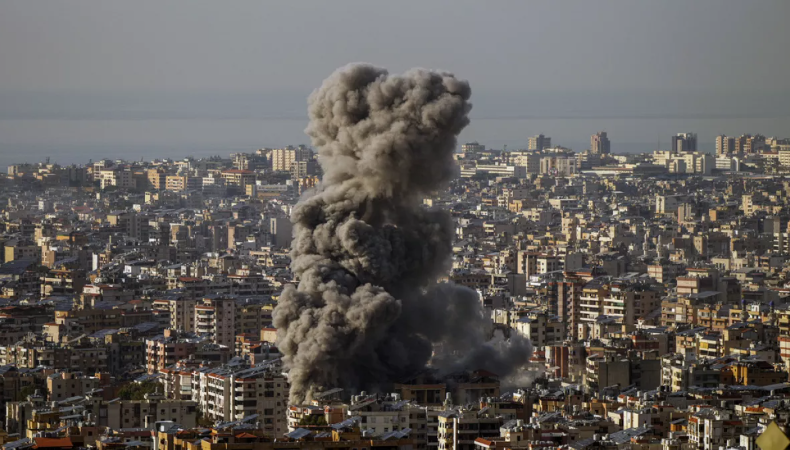Israeli Airstrikes Devastate Central Beirut, Killing 11 in Escalating Conflict with Hezbollah

According to Lebanon’s Civil Defence, a strong Israeli airstrike in central Beirut early Saturday morning killed 11 people and left scores of injured. Described as one of the worst attacks on the city in recent weeks, the one targeted an eight-story building and severely damaged nearby constructions.
According to the National News Agency of Lebanon, Israel struck with bunker-busters that produced a deep hole in the highly populated area. About 4 a.m., the explosions rocked the city awake with their deafening boom. Security personnel verified that during the attack at least four bombs were dropped. A sad reminder of the damage, the smell of explosives still permeated the air hours later.
Escalation within Central Beirut
Since this latest airstrike targets central Beirut and marks the fourth attack this week against Hezbollah, it signifies a notable escalation in Israel’s continuous onslaught against the militant group. Israel’s strikes historically have been focused on the southern suburbs of the city, a Hezbollah stronghold.
But Saturday’s attack landed on a more commercial and residential district noted for its antique stores and cultural legacy. Just days previously, the same district experienced yet another fatal airstrike following an Israeli attack in Ras al-Nabaa killing a Hezbollah media official.
The ongoing bombing of central Beirut exposes a change in Israel’s approach, hence extending its focus outside the southern suburbs.
Scenes of Chaos and Desperate Outreach m
The aftermath of the incident exposed sights of total devastation. Rescue personnel searching for survivors were seen in footage shown on Lebanese television sifting through mountains of debris. One demolished structure lay in ruins, while others nearby suffered major damage with broken windows and fallen façade. Among the victims was Nemir Zakariya, who hurried to a nearby hospital carrying injured relatives.
He tried to console a clearly devastated woman outside the hospital while clutching a picture of his small kid. “There was dust and wrecked houses, people running and screaming,” Zakariya related. “My aunt is in the hospital; my daughter and wife are there as well. Also injured was my son. He mentioned his daughter’s treatment at the American University of Beirut Medical Center. Cars twisted in the streets and trash covered the area, evidence of the extent of damage the pre-dawn attack produced.
Rising Death Count in an Expanding War
Driven by the conflict in Gaza, Saturday’s airstrike is a part of a larger Israeli offensive started in September 2023 following about a year of rising tensions between Israel and Hezbollah. The Health Ministry of Lebanon claims that Israeli strikes have killed 3,645 persons and injured 15,355 since October 2023; civilians account for a substantial share of the deaths.
The most recent numbers show a single-day mortality count of 62 on Thursday following Israeli strikes on several areas of Lebanon. Hezbollah has escalated its strikes on the Golan Heights and northern Israel in reprisals. These actions, comprising missile strikes and direct battle in southern Lebanon, have claimed more than 100 lives, including over 70 Israeli soldiers.
A Regional Conflict Deepened in Geopolitics
Starting October 7, 2023, Hezbollah’s attacks on northern Israel in cooperation with Hamas set off the present battle. Starting their own campaign against southern Israel, Hamas had set off a regional escalation that has already encompassed Lebanon. For Israel, the battle against Hezbollah is considered as a component of a larger plan to neutralize Iran’s sway in the area.
Considered as Tehran’s most important ally, Hezbollah has been essential in Iran’s attempts to question Israel’s military supremacy. The government of Lebanon and Hezbollah have charged Israel with indiscriminate bombing operations disproportionately harming civilians. Israel then refutes these accusations, claiming that its strikes are painstakingly scheduled to target Hezbollah’s military infrastructure and avoid civilian losses.
Natural Resources and Tribal Dynamics: Their Part
Natural resources and tribal dynamics of Lebanon complicate the conflict. Israel and Hezbollah now mostly drive from control over resource-rich regions, hence strengthening the “winner-takes-all” character of the war. Tensions have been exacerbated by historical mistrust among the several ethnic groups living in Lebanon, therefore hindering efforts for a cohesive reaction to the situation.
U.S. mediator Amos Hochstein visited the area this week among the increasing bloodshed in an attempt to arrange a ceasefire. Following conversations with Beirut’s Lebanese leaders, Hochstein expressed cautious hope, noting development had been made. Then he went to Jerusalem to meet Israeli Prime Minister Benjamin Netanyahu and Defence Minister Israel Katz. Key supporter of Hezbollah, Iran, has also demanded a truce, therefore promoting a resolution of the conflict.
Iran’s close ties to Hezbollah, however, hamper its capacity as an impartial mediator since many see its participation as a factor to the escalation. A Deepening Humanitarian Crisis: The ongoing bombings and counterattacks have resulted in a serious humanitarian situation in Lebanon.
Tens of thousands of Beirut and southern area inhabitants have been evacuated and sought cover in packed shelters or fled to neighboring nations. Overwhelmed hospitals all around are trying to handle the surge of casualties while battling shortages of medical supplies and energy. International relief agencies have cautioned that if the violence remains unchecked, the situation may get even worse.
What Then Lies Ahead?
A resolution seems far off as Israel and Hezbollah dig in for a lengthy war. From both sides, the war is seen as an existential struggle devoid of any sign of compromise. For Lebanese citizens, the continuous bloodshed has turned into a relentless nightmare. The issue of whether diplomacy can succeed in stopping a war that shows no signs of winding down continues as foreign mediators advocate peace.




